Zombie Permit Extension – Logging Public Lands – Regulatory Flexibility
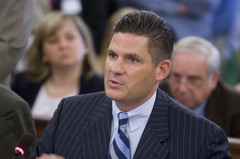
Lou Greenwald (D/Camden)
Hot day in a Trenton lame duck legislative frenzy yesterday – a brief overview
Zombie Permit Extension Act
With virtually no public awareness, in an effort to ram a controversial bill through a lame duck legislature, Assemblyman Lou Greenwald (that economic development champion of importing toxic waste to Dupont’s south jersey Chambersworks facility) quietly posted a bill to extend “The Permit Extension Act”.
(see Star Ledger story: Assembly panel advances bill to extend developer permits
The legislation, made available just a few hours before Thursday’s hearing and still not posted online as of 8 p.m., enraged environmentalists who called it a giveaway to the same developers who bankrolled lawmakers’ recent campaigns.
Because the bill ignores the causes of the economic recession and housing crisis, the bill will do nothing to stimulate the economy, create jobs, or keep people from being foreclosed on and evicted from their homes.
More homeless, more layoffs – more broken dreams and shattered lives.
But the bill will harm future efforts to reduce greenhouse gas emissions, protect public health and the environment, and manage growth.
Some things in Trenton never change – completely out of touch – another cruel hoax (see prior posts on prior iterations of the Zombie Permit Extension Act):
- Sarlo Shills for Banks and Builders (again) (12/14/09)
- A Cruel Hoax – On many Levels (7/1/08)
[Update: 7/20/08 – “Am I the only one who finds it strange that our government so often adopts a so-called solution that has absolutely nothing to do with the problem it is supposed to address?“
Al Gore 7/18/08“The regulatory relief provisions of the bill are totally unrelated to the causes of the economic problems the bill purports to address.”
Bill Wolfe 6/30/08
Opposing a prior Permit Extension bill, in words that are even more relevant today, on July 1, 2008, I wrote:
It’s no secret that thousands of NJ working families are struggling just to make ends meet. The recent housing finance crisis – caused by Wall Street fraud and greed – is forcing thousands of families into mortgage foreclosure and lost hopes and dreams. Thousands of small business – particularly the small home builders – are being driven towards bankruptcy. Credit crunch and high debt levels are causing record rates of bankruptcy filings.
So what do our political leaders in Trenton do to respond?
They grandstand and cynically blame environmental protections and enact a meaningless “solution”, the “Permit Extension Act”.
That law, while rolling back environmental protections, does absolutely nothing to address the underlying causes of serious economic problems.
Worse, few realize (because the issue has not been reported in the press coverage) that the Permit Extension bill treats urban NJ residents like second class citizens and will severely hamper NJ’s ability to achieve Governor Corzine’s highly touted global warming emission reduction goals.
“Regulatory Flexibility” (S1336/A2129)
I went to Trenton yesterday to testify on the Regulatory Flexibility Act bill (see this for analysis of that bill):
Due to a large number of important policy bills on the agenda, the Senate Budget Cmte. was unable to hear that bill and will reschedule a continuation of the hearing.
We will keep you posted on the bill and hope readers weigh in with their legislators on it. It is a real threat and would dramatically change the regulatory process to benefit special interests.
Thus far, the bill has flown under the radar, and already passed the Assembly by a unanimous 75-0 vote.
Commercial Logging on Public lands (S1954/A4358)
In other Trenton matters, the Senate Budget Cmte. released a controversial bill that would allow commercial logging of NJ public lands (parks, forests, Green Acres).
This bill, as amended by the committee, would direct the Department of Environmental Protection (DEP) to develop a forestry harvest program to provide for the harvest of forest products on State-owned lands for which a forest stewardship plan has been developed. The harvest program would allow forest management activities on State-owned lands identified by the department.
The bill is strongly opposed by academic scientists, foresters, and all environmental groups (except NJ Audubon).
Senator Bateman (R/Somerset), Senate Co-sponsor, after learning of the issues raised by the bill, in an unusual move abandoned it and took his name off it and is no longer co-sponsor.
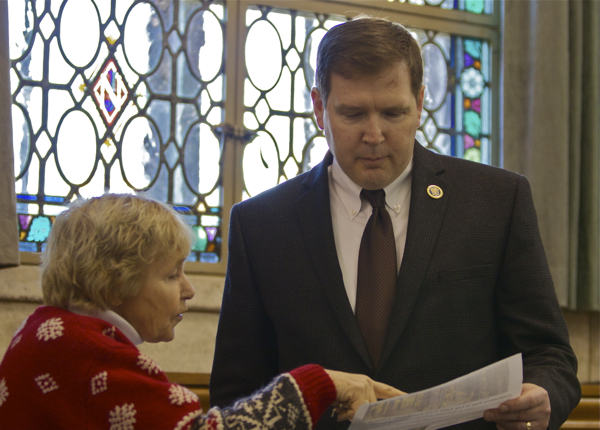
Senator Doherty (R/Hunterdon) listens to former Mayor of Readington Twshp about forestry abuses
A former Mayor of Readington Township testified about environmental and public interest abuses the bill would create, based on a controversial project in her town. She outlined huge public opposition to a local forestry project, which prompted a Hunterdon County Freeholder to say: “We’d have to be some kind of stupid” to support that.

Senate Environment Committee Chair Bob Smith (D/Middlesex)
The sponsor, Senate Environment Cmte. Chairman Bob Smith, one of the few friends of environmentalists in Trenton, claimed he was blind sided by the opposition to the bill.
In highly unusual criticism, Smith claimed that he had support of the environmental groups up until 2 weeks ago, when someone found out that the bill would allow the cutting of a few trees. Smith chastised environmental groups and said that they needed to educate their members about forest management. Ouch!
So, given these contradictory claims, I went back and checked the legislative history and listened to the testimony when the bill was heard and released from Smith’s Committee on June 3, 2010.
I had testified earlier that day on another bill, but had left before the testimony on S1954.
During the hearing, as Smith was going through the testimony sign in sheets, I was shocked by what I heard – noticing that many sign in slips were in the same handwriting, he accused someone of “fraud” for signing up people to testify who were not present at the hearing. He said that this was a major “credibility” problem for that person.
I then listened to the testimony – environmentalists strongly opposed the bill – Sierra Club, Highlands Coalition, ANJEC, NJCF.
So, while I don’t know what transpired between June 2010 and yesterday, Smith clearly knew that there’re were major problems with this bill and enviro’s were not supportive or actively opposed (despite a series of amendments eliminating the Pinelands and putting safeguards in the bill).
Smith left yesterday’s hearing before the controversy could be resolved.
After the hearing, Chairman Sarlo chided Smith for failure to resolve conflicts in the Cmte of jurisdiction, instead of having to listen to environmental testimony in the Budget Cmte.
Sweeney Attacks Labor Rights, Civil Service and Home Rule (S 2794[1R])
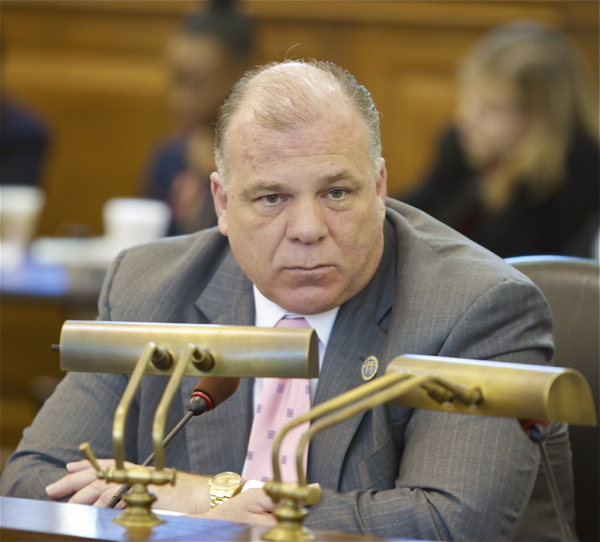
Senate President Sweeney gets pushback from AFL-CIO, CWA and League of Municipalities (12/8/11)
While waiting for the Regulatory Flexibility bill to be heard in Senate Budget Cmte, I listened to the charged debate on Senator Sweeney’s latest strong arm tactics and attack on labor and public employees: (S 2794[1R])
AN ACT promoting the more effective operation of local government and the sharing of services among local units, amending and supplementing P.L.2007, c.63, amending P.L.2007, c.54, and making appropriations.
Sweeney managed a four bagger in his radical shared municipal services bill – attacking – in one bill! – “core labor standards”, the long honored institution of Civil Service, NJ’s home rule, and democratic control, or what Committee Chair Sarlo called = quote: “the will of the People”.
Sweeney presented the bill to the Committee, and immediately went on offense by claiming that all opponents failed to reach out to him with their concerns until the bill was posted for Cmte hearing just days ago.
That statement was promptly challenged by Bill Dressel of the League of Muncipalities, who said the league had met and sent him written criticism of the bill.
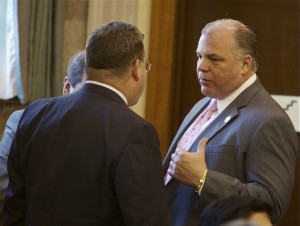
Sweney negotiates with conservative Republican Senators Oroho and O’Toole before hearing
I was pleased to see the League and labor unions (AFL-CIO, CWA, police, firemen) push back against Sweeney’s bullying tactics and attack on public workers.
The bill is a radical right wing shift in policy.
It would strip Civil Service protections, violate “core labor standards”, and would allow an independent Commission to over-ride local governing bodies and a voter referendum, and punish towns who failed to comply with their recommendations by withholding state aid:
If the voters of a municipality do not approve a shared services proposal or if a municipality or other entity identified in a proposed shared services agreement does not enter into and implement the proposed shared services agreement within 14 months following the effective date of the proposal, the State would annually reduce that municipality’s State aid by the amount of savings that was estimated by LUARCC.
… The committee amended the bill to remove the provisions of the bill that would have permitted LUARCC to order a municipality or other public entity to enter into a shared services agreement. The committee amendments also provide that when LUARCC recommends a consolidation or sharing of services, it must consider the impact of the consolidation or sharing of services on the public entity’s ability to comply with State and federal laws and regulations.
But, with the exception of Chairman Sarlo and Senator Buono – Democrats betrayed their principles and political base and fell in line w/Sweeney and voted to release the bill.
And Sarlo got an earful from Sweeney after the vote!
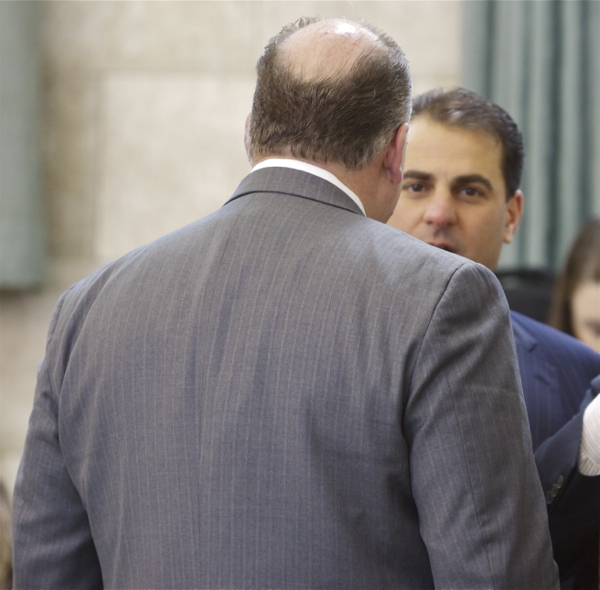
Chairman Sarlo gets an earful from Sweeney after voting against his bill

Pingback: WolfeNotes.com » Legislators Can’t See the Forest for the Fees
Pingback: WolfeNotes.com » Regulatory Flexibility Bill A Formula for Gridlock and Rollback
Pingback: WolfeNotes.com » NJ Senate Committee Backs Regulatory Bailout of Toxic Assets